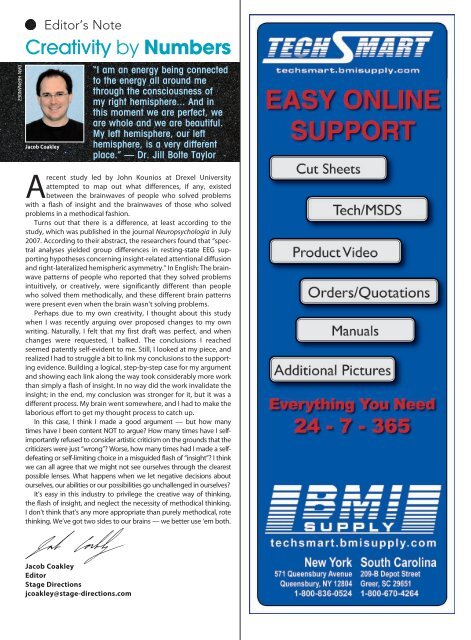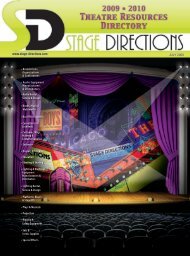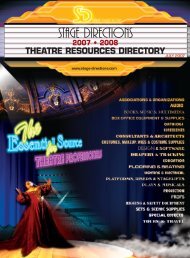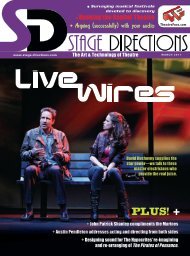Download a PDF - Stage Directions Magazine
Download a PDF - Stage Directions Magazine
Download a PDF - Stage Directions Magazine
- No tags were found...
Create successful ePaper yourself
Turn your PDF publications into a flip-book with our unique Google optimized e-Paper software.
Dan HernandezEditor’s NoteCreativity by NumbersJacob Coakley“I am an energy being connectedto the energy all around methrough the consciousness ofmy right hemisphere... And inthis moment we are perfect, weare whole and we are beautiful.My left hemisphere, our lefthemisphere, is a very differentplace.” — Dr. Jill Bolte TaylorArecent study led by John Kounios at Drexel Universityattempted to map out what differences, if any, existedbetween the brainwaves of people who solved problemswith a flash of insight and the brainwaves of those who solvedproblems in a methodical fashion.Turns out that there is a difference, at least according to thestudy, which was published in the journal Neuropsychologia in July2007. According to their abstract, the researchers found that “spectralanalyses yielded group differences in resting-state EEG supportinghypotheses concerning insight-related attentional diffusionand right-lateralized hemispheric asymmetry.” In English: The brainwavepatterns of people who reported that they solved problemsintuitively, or creatively, were significantly different than peoplewho solved them methodically, and these different brain patternswere present even when the brain wasn’t solving problems.Perhaps due to my own creativity, I thought about this studywhen I was recently arguing over proposed changes to my ownwriting. Naturally, I felt that my first draft was perfect, and whenchanges were requested, I balked. The conclusions I reachedseemed patently self-evident to me. Still, I looked at my piece, andrealized I had to struggle a bit to link my conclusions to the supportingevidence. Building a logical, step-by-step case for my argumentand showing each link along the way took considerably more workthan simply a flash of insight. In no way did the work invalidate theinsight; in the end, my conclusion was stronger for it, but it was adifferent process. My brain went somewhere, and I had to make thelaborious effort to get my thought process to catch up.In this case, I think I made a good argument — but how manytimes have I been content NOT to argue? How many times have I selfimportantlyrefused to consider artistic criticism on the grounds that thecriticizers were just “wrong”? Worse, how many times had I made a selfdefeatingor self-limiting choice in a misguided flash of “insight”? I thinkwe can all agree that we might not see ourselves through the clearestpossible lenses. What happens when we let negative decisions aboutourselves, our abilities or our possibilities go unchallenged in ourselves?It’s easy in this industry to privilege the creative way of thinking,the flash of insight, and neglect the necessity of methodical thinking.I don’t think that’s any more appropriate than purely methodical, rotethinking. We’ve got two sides to our brains — we better use ‘em both.Jacob CoakleyEditor<strong>Stage</strong> <strong>Directions</strong>jcoakley@stage-directions.com
















